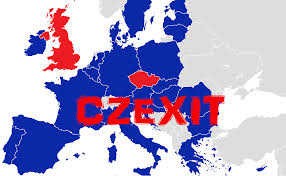
It was the year 1993. I was sitting on a tram in the centre of Prague. I was at that time a recently arrived “expat”, with no clear idea how long I would be here, but encountering amazing new things almost every minute of the day. I noticed an exceptionally beautiful young lady sitting a few seats away; by that time I had realised that this should no longer amaze me. Unlike in London, beautiful young women still took public transport, even late at night . What I thought more remarkable was that she was engrossed in a book; this sadly was hardly ever seen any more in London either. But the thing that really amazed me came as the tram arrived at the Narodni trida stop. She got up and somehow found her way to the door and exited gracefully, all the time with her eyes glued to her book. I realised at that point that I had arrived in a country whose citizens still valued culture. And while electronics have taken over among young people on public transport, it is still evident today that Czechs continue to buy and read books far more than the British do.
That is all very well, I hear you say, but what has this got to do with (Seznam) Médium? Well, it has taught me that Czechs have an appetite not just for reading, but also for writing – even for writing articles that will face public scrutiny and potential criticism. I’m full of admiration for the way Médium has facilitated the opportunity for ordinary Czechs to try their hands at public commentary, and to gently guide them to develop their skills in this area. And while of course there is a great variation in “quality” in the articles (compared to the work of professionals) and an even greater variety of opinions of and reactions to them, I would like to say this as a British national who spends a lot of time on the Anglo- Saxon world: there is nothing else quite like Médium on the web that I frequent, and both Seznam itself and all of you who write here, should be very proud of it; because it says something very positive about the Czech nation. And at a time when there is rising concern about the spread of disinformation – and worse – on the web, Médium is an example that the rest of the world ought to notice.
“You should try to write on Seznam Médium. You will reach a much larger Czech audience”
There are of course other web platforms which facilitate this kind of writing, and I started a year ago with one of them, Substack (it has a rival called Medium, too). But there are some big differences. Let me tell you how and why I arrived here, as a way to illustrate these differences.
Last summer I was already retired from full-time work, and with the pandemic gone, I was indulging my lifelong interest in the modern railway. I had some professional experience of the British railway, in my previous life as an advertising agency director, and had watched with mounting horror the “progress” of the British plan for a high-speed railway, known as HS2. I had a chance meeting with somebody from within the Czech railway industry who suggested that I could help them avoid some of the biggest British mistakes, especially in the area of public communications. But to be effective, he suggested, I should create a social media “profile” that would allow me to present myself to the general public as a “railway advocate”. I have been writing articles, and reports, pretty much all of my adult life, so I felt willing and able to do that, but how exactly? Blog posts on my own website were likely to just disappear into the ether without notice. But when I discovered Substack this seemed to be ideal. It was very easy to use, and looked very professional. I duly wrote my first article, and was quite amazed and humbled when straight away I started getting “subscribers”, some of whom even sent me money, either via BuyMeACoffee, or in a couple of cases taking out a regular paid subscription, which the Substack platform encourages. But they were both personal friends, as were some of the other subscribers, and pretty quickly the numbers stopped growing. And although I realised I needed the articles to be available in Czech, there was another problem; Substack is American, and most of its readers come from the Anglo-Saxon world. I really needed to have a greater visibility with a mainly Czech audience. And then a Czech friend who is also a railway advocate, suggested I join him on Seznam Médium. I must admit that I had never heard of it before, and it immediately presented some challenges compared to Substack. Substack is basically unregulated. It warns you about ensuring that you have permission to use images that are not your own, but nobody actually controls whether I have really done this. I always do, but sometimes I assume that the principle of “fair use” applies. When I sat down to write and upload my first article on Médium (simply a translated version of my first article on Substack) I encountered a range of restrictions regarding image use that I had to comply with, otherwise my article would not be published. It dawned on me that every single article is carefully scrutinised, in the same way as an article in a newspaper or on the main page of Seznam. Then I realised that I was actually being offered the chance to get my article on the main page of Seznam – but only if it was deemed good enough. I was under the scrutiny of an editor! And there was one more thing, which I really had not expected; if I reached a certain target for total views of my articles, after that point Seznam would share advertising revenue from those ads which appeared next to my article. Now I am not looking for revenue from my writing at all, but I have a marketing background. I cannot resist being set a measurable target, especially if a monetary reward is offered for achieving it. I am pretty sure that my reward will amount to the value of no more than one beer a week, but I will still drink that beer with an extra feeling of satisfaction.
Of course I also like “metrics” which inform me about my performance. Substack offers a lot of these metrics, but many are only valid for those who really build up a big regular audience. But there is a basic metric, how many people read the article? So far the biggest number of readers of an article of mine on Substack is 180. When I published my first article on SM it quickly reached 350; the third one reached 1700. It was clear that my friend’s advice to join him here had been good. And when my article about taking the night train back from London to Prague reached 25,000, I was in a mild state of shock. On Substack you have to build your own audience. There are no short cuts. On Médium they offer you the chance to reach a huge audience straight away.
But it has to be “good” enough. And this is how Médium gently trains us; we ask ourselves why one article seems not to be as successful as another. We read other articles; slowly we learn some of the basic disciplines of journalism, and the readership figures for our articles are our reward – or our punishment. I am really impressed with the overall standard of writing; after all most contributors are not professionals and probably have not received any relevant professional training. And the range of topics is truly remarkable. Honestly I have never seen anything like it on the web.
Free speech comes with some responsibilities.
And that brings me to the reason why I think the success of Médium ought to be studied by media owners around the world. Perhaps I should define what I mean by “media owner” . It is a business that makes money by creating and presenting content to watch or read. So TV Nova is a media owner. So is Blesk, and so is Seznam. They make money from the advertising that is placed around the content because the content attracts an audience. However, they are regulated. They are regulated by the law, and by special regulatory conditions which society believes are necessary. TV Nova cannot broadcast pornography, nor can it broadcast a ‘documentary’ about a public figure that is full of demonstrable lies. It is also self-regulated by standards of professional journalism. If it falls below that level, less people will watch their programmes.
Google and Facebook (yes, I know, Alphabet and Meta) are not “tech companies”. They too are media owners. Of course they are. Advertising has always been their main source of revenue. As for the content, this is supplied (without their explicit agreement) by other media owners and by ordinary people. Google and Facebook place their advertising around the content (or the search for it) but they do not pay the creators of the content (so that makes them thieves, in my eyes), nor do they consider that they should be subject to the same regulations as typical media owners. That fundamentally is why so much of social media has become a dangerous cesspit. You can write anything on Facebook, re-post fake videos, encourage fellow citizens to riot. Under pressure Facebook has taken some steps to improve its monitoring of content but it is not enough. Elon Musk, on the other hand has taken Twitter further down into the cesspit. He does not seem to care even that he is losing what little advertising revenue Twitter used to earn. In his ignorance he calls this “free speech”. As a result ordinary people recoil from use of these big social media platforms, and certainly do not believe they are places where they can glean high quality information, or have a high quality, civilised conversation.
One of the common characteristics of articles on Médium is that the tone is always “civilised”. That is what happens when we amateur writers are required to adhere to the basic regulations which “traditional” media are required to follow. We are all now journalists, and our output is being presented to the entire nation. if you hold that thought, or just that hope, you will not wish to write in a way that makes you seem like a (insert your chosen bad word here), especially as your fellow contributors all seem to be “civilised”. Around the world people throw up their hands in despair at “social media”. Some surrender to Musk’s arrant nonsense that “free speech” is the most important thing. Seznam Médium shows that there is a better way. You are free to choose whatever topic you wish to write about. Just don’t be a (your word).
But oh, the comments.
They are not civilized, are they? Well this is a global problem. Unfortunately it became a habit for comments to become a tool not just to make legitimate critical points about articles, but to make quite vicious attacks on the journalists who wrote the articles. On top of that, there is a specific element in the Czech national character at work here, that needs a regular outlet to complain about something – anything. This was explained to me by a Czech qualitative researcher back in 1993 and I have often seen examples of this. It is disappointing to see that comments under articles on Médium can be just as unpleasant; after all here they are not commenting on professional journalism, simply on the efforts of fellow citizens. My personal rule on social media is that I try not to say anything addressed to an individual that I would not say to them face to face. But I must admit that I have not myself suffered any particularly unpleasant comments, and have received quite a few compliments, which can really cheer me up. There was though one comment which I cannot forget, because it introduced me to a Czech phrase that I had never heard before. I understood the meaning easily enough; the writer simply wanted to convey that in his opinion I knew nothing at all about the operation of railways. That’s a comment that I expect to receive; after all I am not a railway operations professional, and railway operations are very complex. But the phrase itself fascinated me.Translated, it reads “the author understands railways like a goat understands parsley”. I ran to my wife, (also a beautiful and cultured Czech lady) asking about the meaning of this phrase. She merely answered that the meaning was as I already understood. But what, I asked, is the background? Why do goats have a problem with parsley? What don’t they understand about parsley.? “it’s just an old phrase” she said, quickly becoming bored with the question. But it has been both amusing and puzzling me ever since. In the photo below, you see my plant box. There is some parsley. It has other vegetables too. If a hungry goat comes along, it’s going to see that box and think, “aha, dinner”. What is it about my parsley that would cause the goat to pause and fret about whether it “understands” it? Why doesn’t it need to also understand the mangold? If you have an answer, dear reader, I would be very interested to learn from you.Apart from the comments, the only thing that frustrates me now about Médium is that I cannot use the data it provides to really work out why some of my articles are successful beyond my most optimistic expectations and others, for which I had high hopes, completely bomb. I have a feeling though that Médium doesn’t really want to give too much help here. I suppose that if we all worked out exactly what to do to get the maximum number of readers, there is a danger that the articles will become too similar, and it will lose the spontaneity and unexpected choice of topics that makes it so authentic – it is a window on the thoughts and concerns of the literate Czech population. It’s better if we are pushed to think about how we can make the next article more successful than the last one, without any “cheat codes”. I know that one of my main faults is that my articles are too long. So let me stop here, and salute the people who thought up this concept, and especially the people who carefully go through all the articles. That requires awesome levels of patience and attendance to detail. I salute too all my fellow contributors, and of course you, dear reader. You have taken me one step closer to a supply of free beer; I thank you, and assure you that the beer will always be



